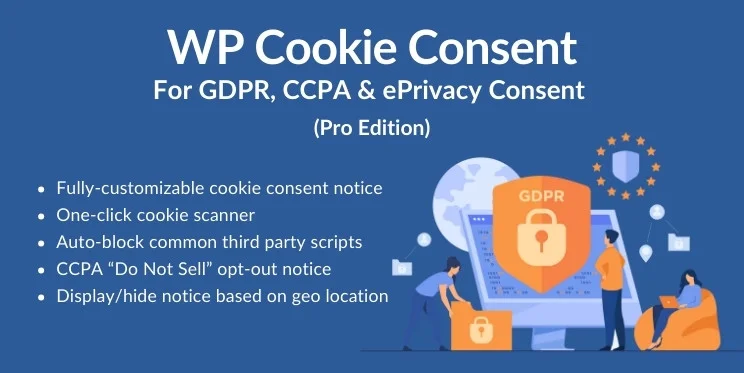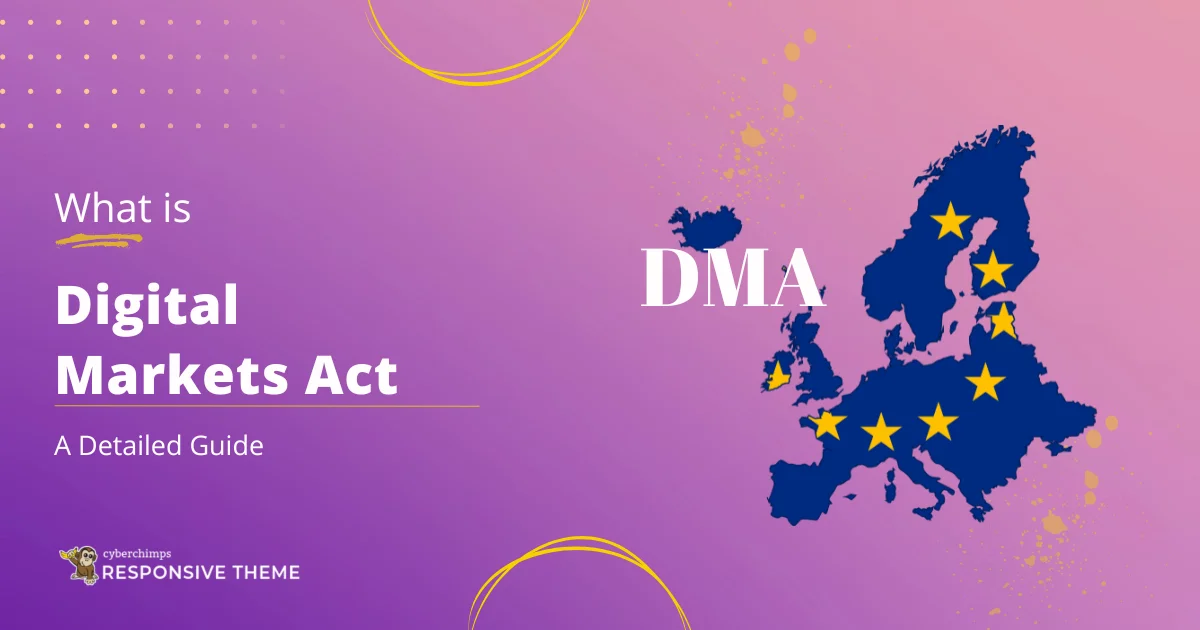Are you a website owner wanting to comply with the Digital Markets Act but need to figure out how the law works?
The need to implement DMA came because, in 2018, 97% of website owners in the EU failed to comply with privacy requirements.
Digital Markets Act is a new law in the European Union that came into force on November 1, 2022 and became applicable on May 2, 2023. EU Digital Markets Act protects unfair online practices that impact users in the European Union.
This article will discuss the goals of the Digital Markets Act, who it affects, and the duties that the Digital Markets Act European Commission classified as gatekeepers must do.
What Is The EU Digital Markets Act (DMA)?
The Digital Markets Act (DMA) was created by the European Union to regulate the practices of large online platforms in the European digital markets. The purpose of DMA is to protect users from unfair online practices. It came into effect on November 1, 2022, and became enforceable on May 2, 2023.
The EU Digital Markets Act focuses on six large tech companies known as gatekeepers dominating the digital world. The six gatekeepers companies designed by the European Union are Alphabet, Amazon, Apple, ByteDance, Meta, and Microsoft.
The main objective of the Digital Markets Act 2022 is to ensure fair competition by prohibiting big tech companies from controlling the market and allowing new competitors to enter.
Who Does EU DMA Apply To?
DMA applies to companies and platforms that significantly influence the digital economy. For instance, platforms that
- Has a broad market reach, significant purchasing power, and longevity over several years.
- Act as a vital link between businesses and prospective customers.
- Enjoy having a strong position that is difficult to overcome.
If a company that operates in the European Union meets all three of these criteria, it must notify the European Commission within two months. After that, the company will go through the official gatekeeper designation process.
To Qualify As a DMA Gatekeeper, Companies Must
- Have a market capitalization of €75 billion from the most recent fiscal year or should have a turnover of at least €7.5 billion in the European Economic Area (EEA) per year for the preceding three fiscal years.
- Have over 45 million end users and 10,000+ annual active business users in the EU.
- Have consistently completed the second requirement for at least three consecutive fiscal years.
In September 2022, the European Union designated six major digital companies as gatekeepers for the Digital Markets Act (DMA). These companies have six months to complete compliance for all their key digital services under the DMA.
The DMA enforces restrictions on its primary platform services, such as social media, cloud infrastructure, search engines, and operating systems, to prevent misuse of the gatekeeper function.
Under the Digital Markets Act, six large companies selected by the European Commission have until March 6, 2024, to comply with the DMA Obligation.
What Are The Requirements of The Digital Markets Act?
The Requirements of The Digital Markets Act requires gatekeepers to comply with the following requirements to fix the current imbalances caused by them.
- Obtain user consent before tracking them for marketing purposes.
- Permit users to change the default settings and delete any apps.
- Permit users to stop using particular features of the platform.
- Gatekeepers must allow businesses to promote their products or services through direct channels or third-party internet services, even if the pricing differs from the gatekeeper’s.
- End users and corporate users must be able to report non-compliance issues to the relevant legal authorities.
- In certain circumstances, let third-party access integrate with the gatekeeper’s services.
In addition, gatekeepers are prohibited from employing unfair tactics. For instance, gatekeepers are prohibited from
- Prioritizing their services over similar services provided by external providers.
- Stopping clients from visiting businesses that are not listed on their platforms.
- Prevent users from uninstalling software or apps.
- Combining personal data from numerous services like Facebook and WhatsApp under one company’s ownership.
- Give their products or services a higher search engine ranking than competitors.
Timeline of DMA
Let us take a look at how DMA law was enforced and became applicable to gatekeepers.
DMA text was approved
by the European Parliament and Council
DMA Law
was published
Digital Markets Act
comes into effect
Most of the DMA
rules became applicable
Digital Markets Act European Commission
designated the six gatekeeper companies.
Gatekeepers have six months
to comply with the new obligations.
European Commission
to update DMA based on market reports.
European Commission to assess
DMA and propose amendments.
Fines and Penalties Under the Digital Markets Act 2022
The Digital Markets Act (DMA) clearly outlines the harsh consequences of breaking its rules. According to Articles 29 and Articles30 of the DMA, a company can be fined up to 10% of its global sales for the first violation and up to 20% for repeat violations that occur within eight years.
In addition, gatekeepers may face recurring fines of up to 5% of their daily average turnover.
Suppose gatekeepers fail to comply with their responsibilities, such as providing accurate information and data access. In that case, they may face penalties of up to 1% of their global revenue from the previous fiscal year.
What Does The DMA Mean For Your Business?

Small websites and applications are not immediately subject to the regulations of the Digital Markets Act. The main objective of the Digital Markets Act 2022 is to promote justice and innovation in the digital world.
Before collecting or processing personal data through gatekeeper platforms or services, consent must be obtained, and the gatekeeper must be informed accordingly.
It is necessary for website owners to keep a record that EU users have given their consent for the processing of their personal data.
A consent management platform like the WP Cookie Consent plugin can be used to obtain consent for cookies and access to personal data.
This plugin is designed to help you enable consent logging and comply with EU laws and regulations.
Additionally, if you have multiple WordPress sites for the same organization, you can obtain user consent on one site and apply it to other sites in the same network.
Checklist for DMA Compliance
The Digital Markets Act (DMA), which focuses on big online platforms referred to as gatekeepers, has a wide reach across the European Economic Area and is changing the digital world.
To ensure the security and privacy of user data, it is essential to take specific measures. Consider the following checklist under DMA guidelines.
- Use secure tools or plugins to obtain user consent and ensure their personal information is safe.
- Keep your privacy policies up-to-date and straightforward to avoid any confusion. Always obtain explicit consent from customers before collecting or using their personal information.
- If you integrate with gatekeeper services like Google Consent Mode, make sure to provide consent signals.
- Give users access to retrieve their data in compliance with DMA regulations.
- Verify the legal compliance of gatekeeper platforms and services. In addition, keep yourself updated on any changes or additions to the gatekeeper’s rules.
FAQ on Digital Markets Act
The penalties for non-compliance with the Digital Markets Act might result in fines of up to 10% of global turnover.
European Commission officials and national competition authorities of the European Union started the Digital Markets Act.
Alphabet, Amazon, Apple, ByteDance, Meta, and Microsoft are the six Gatekeepers the European Union Commission have designated.
Conclusion
Despite being a European regulation, the Digital Markets Act will affect organizations worldwide.
It may even encourage other countries to implement similar laws. As a result of this regulation, the online operations of large tech companies are likely to change, affecting various online platforms.
To comply with the cookies set by the gatekeeper service platform, it is recommended to use a DMA-supporting Cookie management platform like WP Cookie Consent.
If you’ve liked reading this article, check out our other engaging articles as well:
- What Are Analytical Cookies? – A Simplified Guide
- Global Privacy Control: Protecting Data With WP Cookie Consent
- What Are Session Cookies? – A Comprehensive Guide
Do you want to comply with DMA law? Grab WP Cookie Consent tool now.




